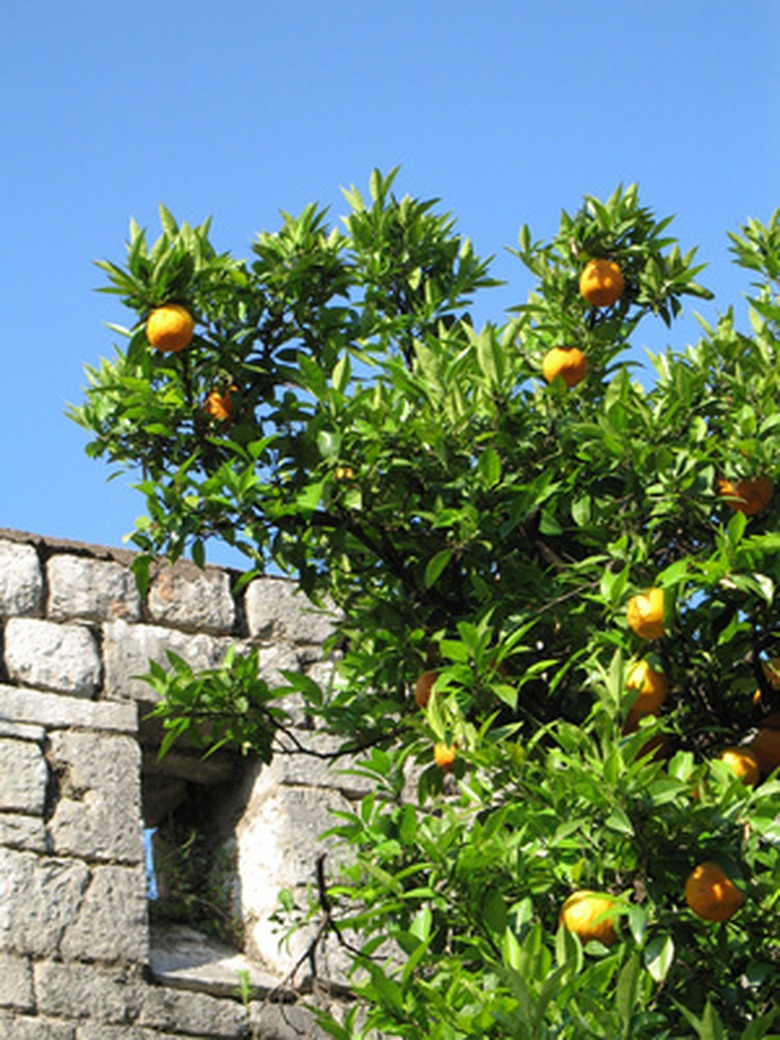How To Grow Citrus Trees In Houston, Texas
Things Needed
- Soil test kit
- Full or partially sunny location
- Well-drained soil
- Compost
- Shovel
- Citrus fertilizer
- Fish emulsion
Houston has the perfect climate for growing all types of citrus trees because winter temperatures almost never drop below 40 degrees F. Summer temps, although warm, rarely exceed 95 degrees. These temperatures mean that you can grow citrus trees outdoors year-round without fear of frost damaging your tree or above-100 temperatures causing sunburned leaves and fruit. You can grow citrus trees in well-drained garden soil in a sunny area or in a large planting container on your patio or pool deck.
Growing Citrus Trees in Houston
Step 1
Test your garden soil if you plan to plant a citrus tree in the ground. Citrus trees do best when the soil pH is acidic, neutral or only mildly alkaline–Texas A&M University's Aggie Horticulture Web site recommends a measurement between 6.0 and 8.0. They also advise that it is best to avoid salty soil and soil with a large amount of caliche (high in gravel, sand or calcium carbonate).
Step 2
Purchase a grafted citrus tree to ensure that you will get the best quality fruit in a timely manner. Trees you start from seed can be mixed hybrids that won't produce the same fruit as the parent tree. Trees started from seed also will take several years more to produce fruit than grafted trees.
- Houston has the perfect climate for growing all types of citrus trees because winter temperatures almost never drop below 40 degrees F. Summer temps, although warm, rarely exceed 95 degrees.
- These temperatures mean that you can grow citrus trees outdoors year-round without fear of frost damaging your tree or above-100 temperatures causing sunburned leaves and fruit.
Step 3
Dig a planting hole in spring that is about twice the size of your tree's rootball. If grass or weeds cover the area, remove them within a 3- to 5-foot diameter around your planting site. Mix 1-gallon bucketful of any type of compost into each 5 gallons of soil you dig out. Take your tree out of its nursery container and set it into your planting hole to determine how much soil/compost mixture you need to replace before planting. Next, backfill your planting hole to a level that will allow your tree to sit with the base of its trunk above the top of the soil. Water it well. Place your tree back into the hole, then fill it with additional soil/compost. Be sure not to bury the trunk, and especially do not bury the portion of the trunk where the graft occurs. Firm the soil gently with your foot, then water it well.
- Dig a planting hole in spring that is about twice the size of your tree's rootball.
- Next, backfill your planting hole to a level that will allow your tree to sit with the base of its trunk above the top of the soil.
Step 4
Fertilize your citrus tree about one year after you plant it when you begin to see strong signs of new growth. Use a plant food specially formulated for citrus and apply it once each month from spring through October. Texas soils generally need nitrogen to help support citrus trees, but Aggie Horticulture states, "additional elements should not do any harm." If you use a granular fertilizer, scatter it on the ground about 1 foot from the trunk, then sprinkle the area with water. If the leaves begin turning yellow, give your tree a dose of chelated iron.
Step 5
Prune your citrus tree to keep it a manageable size that will make harvesting fruit easier than it would be on a taller tree. Prune in the winter months to avoid cutting off new growth that might contain flower buds or forming fruit. Citrus trees do fine without pruning.
- Fertilize your citrus tree about one year after you plant it when you begin to see strong signs of new growth.
- If you use a granular fertilizer, scatter it on the ground about 1 foot from the trunk, then sprinkle the area with water.
Step 6
Spray your tree with insecticidal soap if you notice aphids, mites, scale insect or other crawling insects. Aggie Horticulture reports, "Few pests actually kill citrus trees..." if powdery mildew strikes your tree, use a sulfur spray.
Tip
Fish emulsion is a good fertilizer for citrus trees, so if you want to avoid chemical fertilizers and go organic, fish emulsion is a good choice. Mix and apply it according to label instructions.
